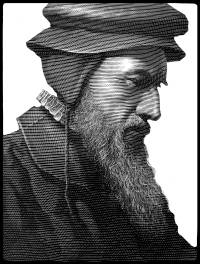Calvinism is not a monolithic reality (thus this blog), historically, often times I find, when interacting with classic Calvinists, that there is the pervasive belief that “their” tradition  is pure gospel without development. I think the following, at least, illustrates that this is too reductionistic, and in fact there is significant disagreement between someone like John Calvin (Evangelical Calvinist par excellence) and Theodore Beza (classic Calvinist the fountain-head), on the ordo salutis and the decrees.
is pure gospel without development. I think the following, at least, illustrates that this is too reductionistic, and in fact there is significant disagreement between someone like John Calvin (Evangelical Calvinist par excellence) and Theodore Beza (classic Calvinist the fountain-head), on the ordo salutis and the decrees.
In Richard Muller’s book: Christ and the Decree: Christology and Predestination in Reformed Theology From Calvin to Perkins, he is discussing Theodore Beza’s articulation of Christ and the decrees relative to predestination and the consequent doctrine of sanctification and assurance. Let’s hear from Muller on Beza’s view on “finding assurance” of salvation:
The syllogismus practicus [practical syllogism] appears in Beza’s thought as, at most, a partial solution to the problem of assurance. Beza frequently spoke of the inner witness of the Spirit as a ground of assurance, particularly in the context of justification and sanctification. This accords, on the one hand, with Beza’s forensic definition of justification and, on the other, with his recognition that sanctification could not be equated with progress toward a sinless life; in neither case could the empirical syllogismus enter the picture as the sole ground of assurance. But when Beza asks the question of the Christian life that results from faith, justification, and sanctification, proceeding, that is, from the divine cause to its human effects, he more pointedly even than Calvin, demands that good work follow. Throughout Beza’s works there is a tension between the spiritual and the emperical grounds of assurance: there is, in the relatively late study on Ecclesiastes, a denial of any use of material riches as a sign of justification or election–but in the isolated statement of the Catechismus compendarius, the syllogism rears its head in unabated form.
As Bray remarks, we encounter in Beza hardly a trace of Calvin’s teaching concerning Christ as the ground of assurance. There is a strong christological center in all of Beza’s attempts at systematic formulation and we sense everywhere the connection between Christ and the decree, but on the problem of assurance, which must always relate to causally to the decree, there is little christological discussion. In a sense, then, Beza allows more of a separation to occur between the munus Christi and the ordo salutis than does Calvin, to the end that the causal-empirical and pneumatological interests of the ordo predominate. . ..[1]
The first point I want to highlight on Beza is that according to Muller the “Practical Syllogism” played a heavy role as the basis for the elect to find assurance of salvation—in other words, empirically “proving” salvation was predominate within the soteriology of Beza. Secondly, there is a juxtaposition between the trajectory set by Beza versus the trajectory set by Calvin in regards to the basis of finding assurance (Calvin, according to Muller, believed that Christ alone was the sole base for finding assurance of salvation[2] vs. Beza who “demanded” that good works are necessary if a person is to have assurance of salvation).
While Beza desires to present a Christocentric soteriology, it appears, at least according to Muller’s analysis, that he becomes bogged down by concerns relative to ordo salutis rather than to emphasize the PERSON AND WORK of Jesus Christ.
Let me leave with a suggestion: it is this kind of Calvinism that is considered “Orthodox” today, the kind that was ratified at the Synod of Dordt. Again, this kind of regimented Calvinism finds its genesis and shape through its Doctrine of God. The “Doctrine of God” that leads to a Bezan understanding (even a Westminster understanding), is the one informed by what has been called Thomism; that is, Thomas Aquinas’ (Roman Catholic scholar) integration of Aristotelian categories of the infinite with the Christian God. If we err at this point, which I believe Classic Calvinism has, then every other doctrine (including soteriology, issues dealing with salvaiton) will be skewed from an actual “Evangelical” understanding of Christian theology.
In fact, it is this issue that will determine whether someone ends up an Evangelical Calvinist versus a classic Calvinist; that is how we “start” out talking about God. I will need to unpack more of this later . . . I can do some of that in the comment meta if you want.
PS. If anything, I want you to walk away from this post realizing that there really is a discernable distinction, very early on, to be made amongst Calvinism[s]. Thus, at the least, my blog title is warranted; and in fact, within the history of ideas, these distinctions are demanded if we are going to be “people of the truth” (Janice Knight has made a distinction between English Calvinism, one she labels The Spiritual Brethren [which would correlate closely to our “Evangelical Calvinism”, in some ways], and The Intellectual Fathers [which would correlate to “Classic Calvinism”, exactly]).
*I originally posted this post in 2009, three years prior to the publishing of our first book on Evangelical Calvinism.
[1] Richard Muller, Christ and the Decree, 85.
[2] See Bobby Grow, “’Assurance is the Essence of Saving Faith’: Calvin, Barth, Torrance and the Faith of Christ,’” in Myk Habets and Bobby Grow, eds., Evangelical Calvinism: Vol. 2: Dogmatics&Devotion (Eugene, OR: Pickwick Publications and Imprint of Wipf&Stock Publishers, 2017), 30-57. I offer a constructive critique of Calvin’s doctrine of assurance showing that he does indeed have a Christological superstructure at play, but because of his commitment to some abstract thought vis-à-vis the decretum absolutum, fails to hold a consistent theological line in his attempt to offer a genuinely evangelical doctrine of assurance of salvation.
